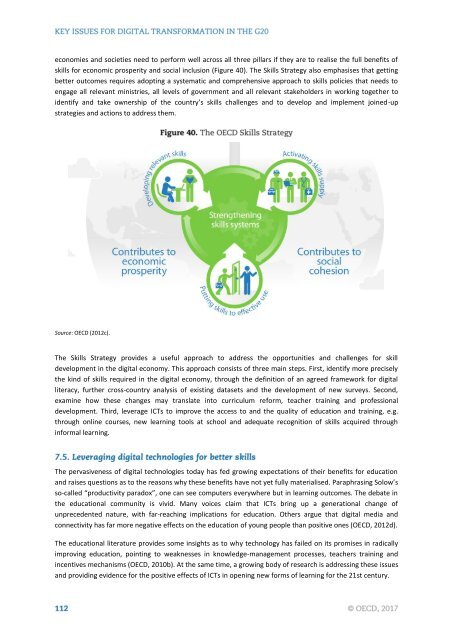KEY ISSUES FOR DIGITAL TRANSFORMATION IN THE G20
2jz0oUm
2jz0oUm
You also want an ePaper? Increase the reach of your titles
YUMPU automatically turns print PDFs into web optimized ePapers that Google loves.
economies and societies need to perform well across all three pillars if they are to realise the full benefits of<br />
skills for economic prosperity and social inclusion (Figure 40). The Skills Strategy also emphasises that getting<br />
better outcomes requires adopting a systematic and comprehensive approach to skills policies that needs to<br />
engage all relevant ministries, all levels of government and all relevant stakeholders in working together to<br />
identify and take ownership of the country’s skills challenges and to develop and implement joined-up<br />
strategies and actions to address them.<br />
Source: OECD (2012c).<br />
The Skills Strategy provides a useful approach to address the opportunities and challenges for skill<br />
development in the digital economy. This approach consists of three main steps. First, identify more precisely<br />
the kind of skills required in the digital economy, through the definition of an agreed framework for digital<br />
literacy, further cross-country analysis of existing datasets and the development of new surveys. Second,<br />
examine how these changes may translate into curriculum reform, teacher training and professional<br />
development. Third, leverage ICTs to improve the access to and the quality of education and training, e.g.<br />
through online courses, new learning tools at school and adequate recognition of skills acquired through<br />
informal learning.<br />
The pervasiveness of digital technologies today has fed growing expectations of their benefits for education<br />
and raises questions as to the reasons why these benefits have not yet fully materialised. Paraphrasing Solow’s<br />
so-called “productivity paradox”, one can see computers everywhere but in learning outcomes. The debate in<br />
the educational community is vivid. Many voices claim that ICTs bring up a generational change of<br />
unprecedented nature, with far-reaching implications for education. Others argue that digital media and<br />
connectivity has far more negative effects on the education of young people than positive ones (OECD, 2012d).<br />
The educational literature provides some insights as to why technology has failed on its promises in radically<br />
improving education, pointing to weaknesses in knowledge-management processes, teachers training and<br />
incentives mechanisms (OECD, 2010b). At the same time, a growing body of research is addressing these issues<br />
and providing evidence for the positive effects of ICTs in opening new forms of learning for the 21st century.


